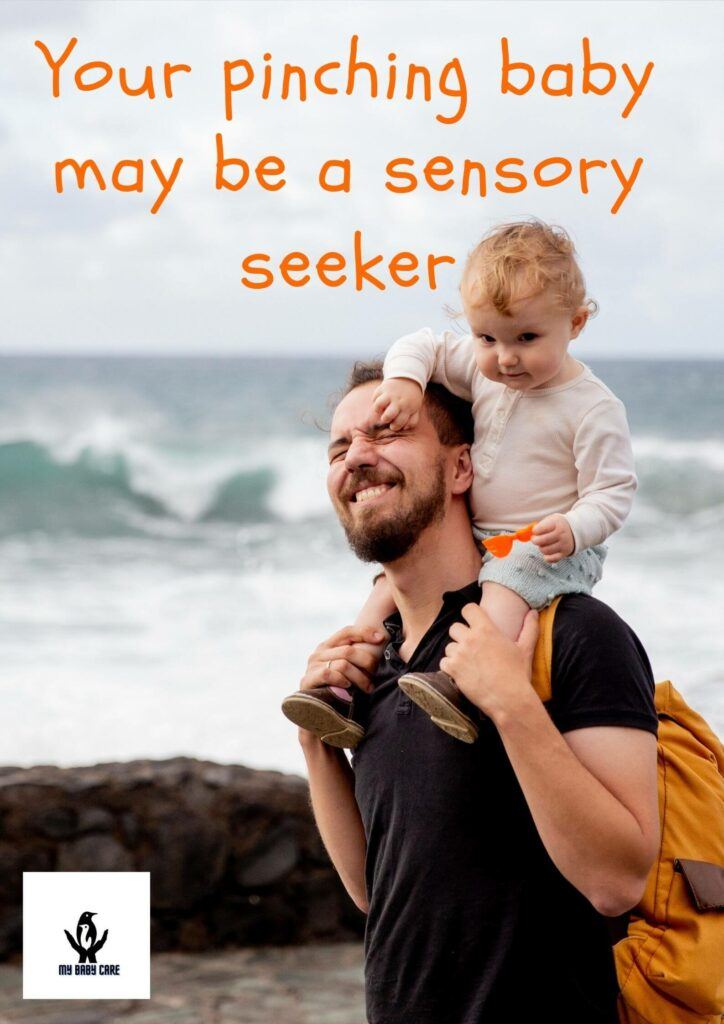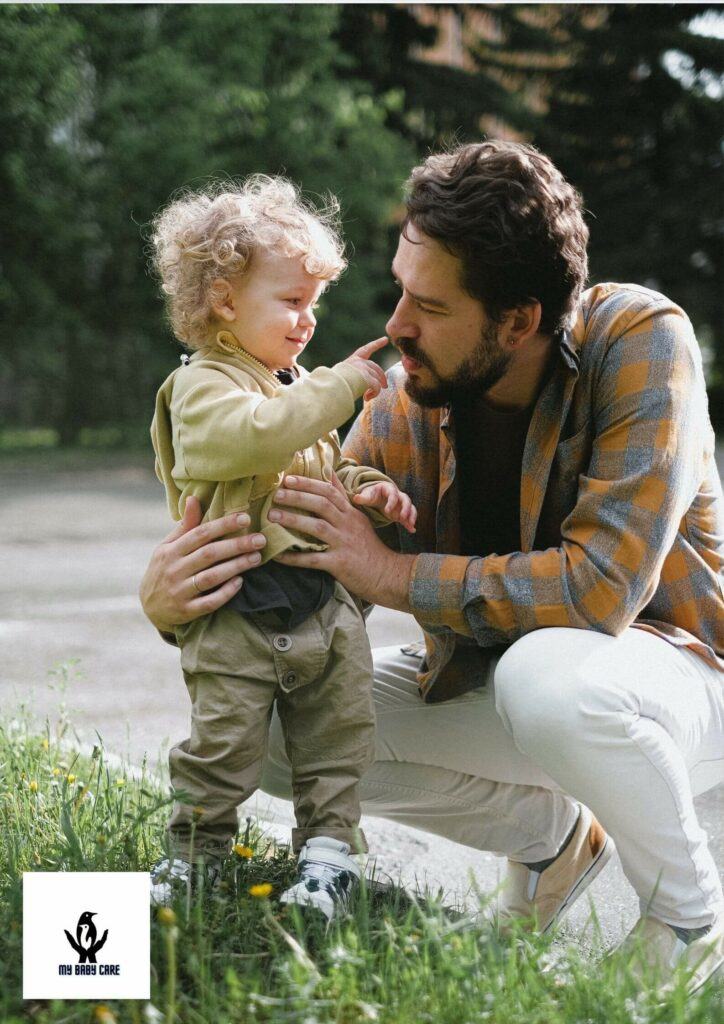Your children are always exploring things in the surrounding world. They experiment things with various things they find.
So children bite, have full hair, and pinch. Sometimes they do it for themselves and others as well. This mostly happens in 6-12 of age.
Your baby needs to pinch you first and then they want to see what you all do. Did you experience this? Sometimes this issue can be considered a behavioral issue.
Please be patient to show your response to them. If you laugh or show your anger at them, they will try the same thing to see your response.
Sometimes they might be fascinated by your reaction. Finally, they develop their desire to repeat the thing.
Pinching for emotional needs and sensory needs
Toddlers pinch, bite, and pull hair. They are excited with another set of emotions such as anger, upset, frustration, etc.
Some children need to imitate other children. So once they have seen the other children pinch or pull their hair, they start to do the same thing to themselves and others.
Babies and toddlers might pinch others, bite, or pull their hair. They feel overwhelmed by too much noise, light, or other sensory stimulations.
Sometimes they create an opportunity for active playing. They need a small change when they feel overtired or hungry.
Why does your child pinch
There are two probable causes for pinching. Sometimes young children don’t yet have communication skills. They are unable to express their desires and feelings to others.
So these kids use negative bodily responses and negative responses to communicate their desires and feelings.
So pinching comes as a communicative method to express feelings and desires at the pre-verbal stage of children.
Some categories are still pinching and biting as repetitive behavior. Even though they don’t have the pre-verbal excuse.
This behavior pattern is a kind of attention-seeking attempt whatever the activity the children are engaged in.
They seek immediate attention from everyone surrounding them.
Most moms are trying to re-correct their children by engaging in the discipline of the kids.
But I strongly suggest the parents should focus on the improvement of the communication skills of their kids instead.
Start with giving positive attention to your kids as they don’t have to act up in order to seek attention.
When your children use their words to communicate, you can use positive reactions by saying thanking words in a soft tone.
IF YOUR KIDS ARE WELL EQUIPPED TO EXPRESS THEMSELVES VERBALLY AFTER THEY DEVELOP THEIR OVERALL SKILLS LIFETIME TO PULL OUT THEIR NEGATIVE BEHAVIORS.
Why does the child pinch while falling asleep?

Children always love to do repetitive movements. They use these movements to self-soothing and release the excess energy by pinching.
This will help for a calm sleep cycle while they are in bed. The calming effect brings them a good sleep.
This is commonly happening with children having medical conditions such as hyperactivity, ADHD, autism, etc.
You might notice this behavior during the children’s development transition or when they are stressed or disturbed about something.
What should you do about this behavior?
Firstly we need to identify the exact causes of this behavior. Then we can address them. Here you may need professional assistance sometimes.
You need to make sure that your child gets enough attention. If not, try to speak to your family members and provide them with as enough attention as possible.
You need to prioritize your child and give enough bonding and cuddling time within your daily routine.
You need to evaluate that your family is experiencing a stressful situation in day-to-day life. If you identify such a case you need to address those for the sake of your child’s peace.
You need to pay careful attention to the sleeping time of your child. If they feel sleepy too early in the day, they will vent off excess energy in pinching or another form.
They should put themselves to bed when they are sleepy.
You need to adjust your behavior pattern as a parent. You should not behave violently with your child.
Always try to remain calm and if the child is at an understandable age, talk to them about the strange behavior pattern. Gradually try to find out their feelings.
When to be concerned
This pinching behavior is normal for children most of the time. But it may be an indicator of any other medical problem sometimes.
Most of the time autistic and ADHD children are showing this kind of strange behavior patterns due to various reasons.
These kids may have presented with sensory deficits most of the time.
They try to pinch other people to fulfill their sensory needs whether they are at the hypo-sensory level or hyper-sensory level.
Also, these autistic kids tend to fixate on repeating some behaviors regularly. So they soothe themselves by repeating specific behaviors.
You need to meet a behavior analyst or occupational therapist to address the sensory or behavior issues of the child.
ADHD children are trying to unleash their excess energy through repetitive actions. So parents need to think of reducing their energy by occupying them with productive activities with those kids.
You can get the professional assistance of physiotherapists, occupational therapists, and speech therapists to get maximum productivity.
When a child continually has the urge to do a particular action, again and again, physicians diagnose a medical syndrome called Tourette syndrome.
Their assessment types are different and if you think your child has a severe pinching behavior pattern, I suggest that you need to undergo an assessment which is done by an experienced physician. So talk to your doctor soon.

Some useful tips
If you think that your child pinches when he/she is angry, the best option is to divert their attention to other fun activities. It is better to take the kid open air.
A garden or a calm place that is open and full of natural beauty is ideal for him/her. It is helpful for you to calm down and soothe your kid easily.
When the anger phase is over, you can speak to the child calmly and peacefully. you can make them understand the bad effects of anger.
Teach them creative ways of communicating with others. You can use the appreciative tokens for your child’s good behavior at this time.
Speak to your behavioral therapists or another healthcare professional to manage the kid with simple and practical techniques.
If your kid is younger than 1 year, you need to gently and simply stop the offending behavior. Use simple actions to prevent the pinching and biting of your kid.
You can gently remove their hand when they pinch you. You can place your two fingers in their mouth if they bite you. Use simple soft words such as ” No. That brings pain to mommy or it’s hurting etc. “
If you have older babies who try to pinch all the time, you should not overact. Older babies get fun out of pinching others. So if you show your restlessness, they might repeat the action.
It is better to offer an alternative and offer a token of appreciation if they listen and follow the instruction.
Handle your baby in a gentle manner. Try to understand the actual cause of why they are pinching all the time.
You can make daily diaries of your kid to track the rapidly changing behaviors of your baby.
Final thoughts
Children always try to explore the surrounding world. So they do various methods to do this. At 6-12 years of age, they do pinching as an exploration of their outer environment.
In this age limit, most of the kids are not communicative enough to express their needs verbally. So they try another alternative way to express the idea. Pinching is one of them.
Also, this may be a behavioral problem of your kid or related to another type of medical condition such as autism, ADHD, or hyperactivity.
So you need medical assistance in such situations. So keep a close observation of your kid. That will provide you with enough evidence to talk with your physician.
Try to maintain a daily diary to track the daily behavior of your kid. Always admire their good behavior of them. Give them a token of appreciation, if you achieve the desired results in managing their behavior.


I’m not sure enough research has went into the different aspects of autism and adhd within this article. Maybe some professional links to other articles to support your article wouldn’t go a miss. The layout of your website and articles are good. I’m impressed with how many everyday questions you’ve managed to cover
thanks a lot.
actually, all the everyday questions have on their own grounds to deal with a specific reason. As a medical professional, I hope I can provide evidence-based solutions for them. Keep in touch with the blog and hope you can get the advantage